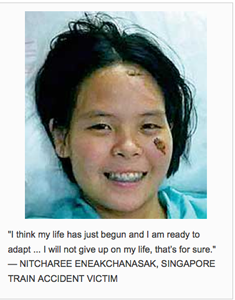A 14-year-old Thai girl student fell onto a Mass Rapid Transit (MRT) track in Singapore on the morning of April 3. Nitcharee Peneakchanasak, also known as Nong Than, lost both her legs below the knees. One of her legs was severed by the train as it came into the station, and the other was so badly mangled that it had to be amputated by surgeons.

Ten days later, she told a reporter of the Bangkok Post, ‟I’m recovering really well after the surgery and hopefully I’ll be able to leave hospital in the next four weeks.” She said she felt much better now and was beginning to accept what had happened to her. ‟I think my life has just begun and I’m ready to adapt to a new life
I won’t give up on my life, that’s for sure.” The brave teen revealed that she had not cried once and remained conscious throughout the rescue operation. When she recovers and is walking again, she wants to finish her studies in Singapore and graduate from university, ‟I want to stay in Singapore because this country has all the public infrastructure systems and facilities for disabled people.”
It is already quite remarkable to see how this teenager reacted with such courage and confidence in her future. But it is even more inspiring to witness that, instead of seeking substantial financial compensation for herself from the authorities in charge, her initial reaction regarding this accident, which has touched the hearts of the people of her country, has been to consider the situation from an altruistic point of view. She said she wanted her case to be ‟a wake-up call” for Thai authorities who were duty-bound to provide proper safety measures on their commuter trains. In addition, she demanded that the Thai government pay closer attention to the plight of the disabled by providing a basic public infrastructure that would help them to get around more easily and make their lives more enjoyable.
In seeing his daughter in hospital, Nong Than’s father had to hold back his tears. ‟She has never complained about her fate,” he said and ‟she has been able to quickly adjust to her new circumstances.” He added, ‟All the hospital doctors and staff who have met her feel great appreciation for her strength and positive attitude.” Every day since the accident, many Thai residents have donated money to help Nong Than.
A few pages further in the same Bangkok Post paper, we read that the twin brothers, Tyler and Cameron Winklevoss, former Olympic rowers, have for years filed lawsuits against the founder of Facebook, Gary Zuckerberg, whom they accuse of having created the famous social network behind their backs, while he should in fact have been implementing on behalf of the brothers a similar network for former Harvard students. In 2008, following an initial lawsuit, the brothers received a large number of Facebook shares as part of the settlement, shares whose current estimated value amounts to 200 million dollars. But they are still not satisfied. They feel that the value of these shares had been intentionally underestimated by the adverse party, and they have therefore initiated appeals in the hope of receiving much more. Meanwhile the judge has stated, ‟The Winklevosses are not the first parties bested by a competitor who then seek to gain through litigation what they were unable to achieve in the marketplace.”
What can be done with 500 million dollars that cannot be accomplished with 200 million? Not much for oneself at least. A great deal for others, certainly, as long as one is concerned for their fate and that one actually opts to use this money for their welfare.
Simply putting these two articles side by side becomes a life lesson. The contrast between the two attitudes described therein is indeed striking. On the one hand, an altruistic reaction, a refusal to give in when faced with such a cruel outcome, a zest for life in spite of everything, and confidence in life’s possibilities; on the other hand, so it seems, resentment and a will bent on fighting against someone who has had greater success, and especially dissatisfaction, even after having been compensated to the point of having clearly enough to live in great wealth for the remainder of one’s life.